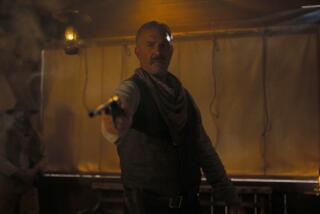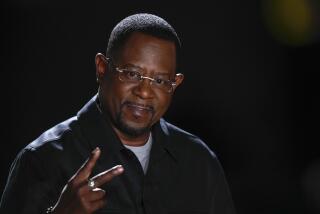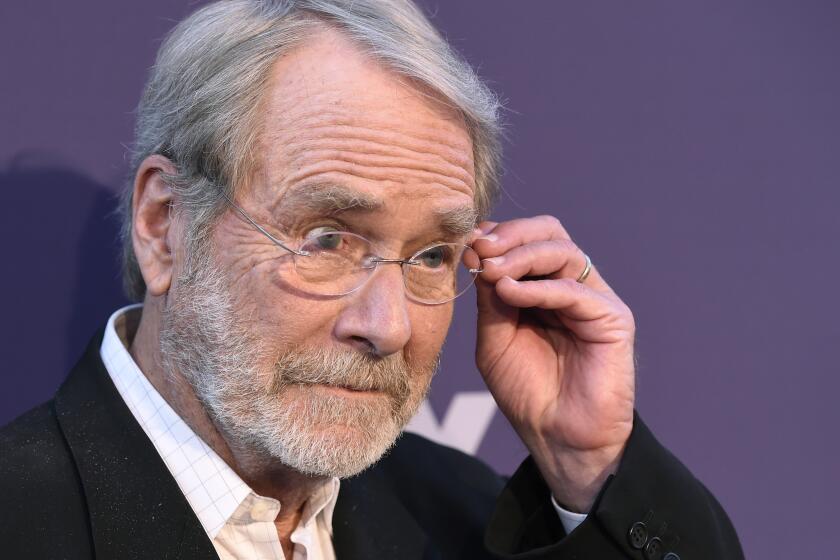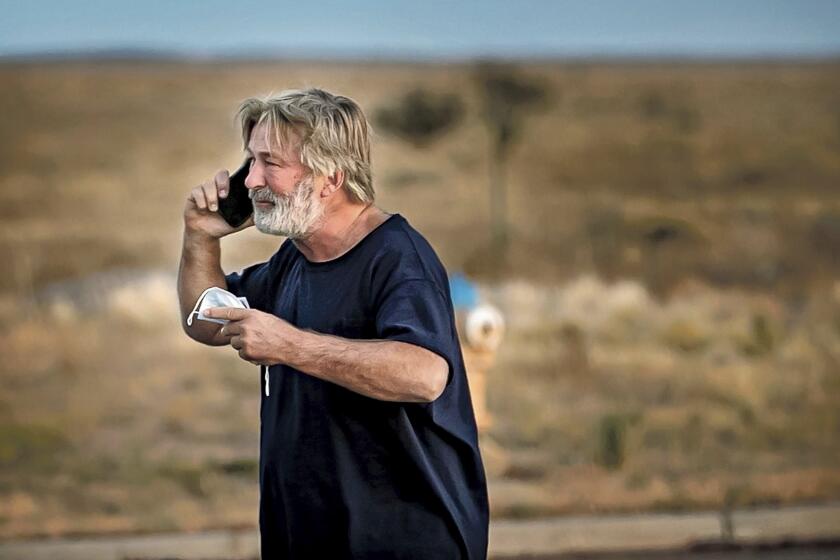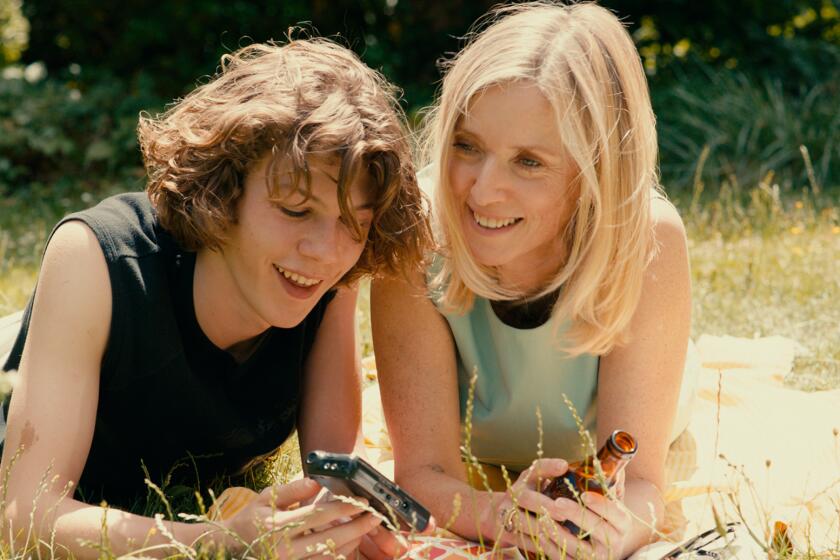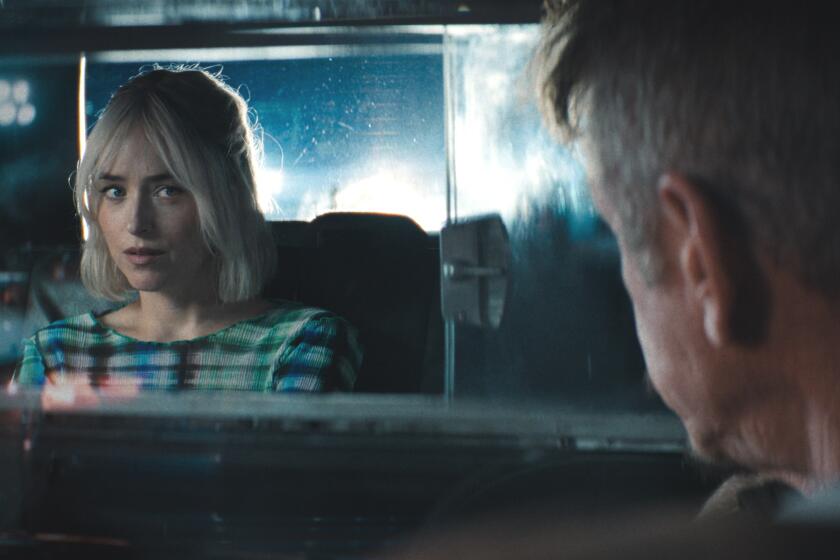Director Regrets Taking Some of the Sex Out of ‘Sin’
In a summer film season teeming with futuristic, special effects-driven stories aimed at children--of all ages, perhaps--is there room for an erotic thriller based on a novel by one of the fathers of film noir? Michael Cristofer is counting on it.
The writer-director of “Original Sin,” which stars Angelina Jolie and Antonio Banderas, is as passionate discussing the challenges he faced in telling a story with strong sexual content as his on-screen characters are while making love.
“I got nailed by the censors,” he reports of the Motion Picture Assn. of America’s insistence that he make cuts in order to achieve an R rating. “I know they don’t like to be called censors, but they are. This film is about sexual obsession, and I had to cut, for my money, just too much of the sex.”
Steadfastly opposed to any ratings system, Cristofer carefully chooses his words, aware of the controversy surrounding the subject. “The guidelines don’t help,” the director said. “And as soon as you have a guideline, there’s a reaction to the guideline. Ours is a reactionary culture, and the fear of sexuality is rampant in American society.”
Cristofer has confronted what he perceives as that fear head-on in each film he has directed, from the 1998 HBO movie “Gia,” which catapulted Jolie to stardom, to 1999’s “Body Shots,” a look at the after-hours antics of a group of twentysomething urbanites. Nevertheless, Cristofer contends that he’s not out to deliberately flaunt sex as an attention-grabber. Rather, he says, sexuality is an intrinsic element of the tales he’s telling.
“I think we’re in denial about sex, and we’re in denial about death and we’re in denial about love,” he said in a recent interview. “These are things that we as a society pretend don’t have anything to do with us. I’m not making films that preach to anything. I’m trying to make films that entertain, but I have to go with what I know and what I feel and what I think is the makeup of people--and I see people who are aware of their sexuality and deal with it and who are aware of death and deal with it and who have an understanding about love or who pursue an understanding of love.”
This dynamic underscores “Original Sin,” the MGM release that opens today. Cuban businessman Luis Vargas (Banderas) prepares to meet his mail-order American bride, but when Julia Russell (Jolie) steps off the boat, she bears no resemblance to the plain woman in the photograph he’d received. Immediately struck by her sultry beauty, Luis accepts Julia’s account of why she sent him someone else’s picture, and they are married. Luis remains blissfully happy--until Julia disappears with all his money.
At its core, Cristofer says, “Original Sin” is a love story “about facing the dark side of yourself as well as the light side, and understanding that human beings are made of both things.”
“I know this sounds like such basic tripe,” he admits, “but we have to know ourselves better and accept ourselves, and I think movies can do that. But right now they don’t. They lie, and that, I think, is damaging. I think a failure that’s trying to tell the truth is much more interesting than something that’s a successful lie.”
“Original Sin” is based on the 1947 novel “Waltz Into Darkness” by Cornell Woolrich (published under his pseudonym, William Irish). Woolrich’s hard-boiled, unsentimental novels and stories about men and women pushed to the edge have been made into dozens of movies--most notably Alfred Hitchcock’s 1954 classic “Rear Window”--and helped inspire the French film noir movement. Francois Truffaut’s adaptation of “Original Sin” was released in this country as “Mississippi Mermaid” (1969) and starred Catherine Deneuve and Jean-Paul Belmondo.
Cristofer, who won a Pulitzer Prize and a Tony Award for his 1975 play “The Shadow Box,” was approached to adapt “Original Sin” nearly 10 years ago. The project bounced from studio to studio before landing at MGM. Shooting the film last year in Mexico on a budget of about $16 million, Cristofer retained the novel’s late-19th century time frame (Truffaut set his film in the present).
“There’s a wonderful old-fashioned, melodramatic style to the story that I didn’t want to have to give up,” he says. “In some ways, people behaved differently in that period, but in the end they also behaved very much in a contemporary fashion.”
Like his character Luis, Banderas has also been obsessed with Julia. “In 1975, when I was 15 years old, I saw ‘Mississippi Mermaid,”’ the actor recalls. “I was shocked by the story of a man who continuously is just put down by the woman he loves, but he continuously goes back to her and puts his life in the line of fire for that love. For 20 years, I was telling the story to friends, but I couldn’t find the movie again, and the story grew in my mind in a different way.”
Several years ago, Banderas found “Mississippi Mermaid” on video. “When I watched it, I discovered that the movie I’d had in my mind was completely different from the movie that I saw,” he says. “During all this time I was adding things to it--I remember shots of Jean-Paul Belmondo in the snow, I can even tell what they were using on the camera lenses, but they don’t exist!”
Banderas imagined buying the rights to “Waltz Into Darkness” and directing it himself. Cristofer knew of Banderas’ interest in the project and fashioned the role of Luis for the actor, setting the story in Cuba instead of its original New Orleans location.
“Original Sin” was originally slated to open last November, but Cristofer was adamant that the film could not be properly ready by then. The release date was changed to February and trailers were in theaters, but the film was held again because MGM didn’t want to compete with its big marketing push for “Hannibal,” which opened that month.
“At the last minute,” Cristofer says, “[MGM] decided to release it in the summer.”
It probably doesn’t hurt that Jolie’s face is fresh in filmgoers’ minds from the big-budget hit “Lara Croft: Tomb Raider.” And while on the surface her two roles seem to have nothing in common, Lara Croft and Julia Russell do share a take-no-prisoners approach to getting what they want. “They’re both survivors,” Jolie says. She was eager to work with Cristofer again after the success of “Gia,” Cristofer’s directorial debut, for which he won a Directors Guild of America award and she a Golden Globe.
“I’d pretty much work with Michael on anything,” she declares. “He’s not trying to manipulate people to try to get some shocking moment out of them. He’s really studying human behavior and wants to try to shed light on things without making a judgment.”
Given his penchant for sexually provocative material, it seems appropriate that Cristofer’s next project is a script about the legendary 18th century lover Casanova, which he is writing for, of all studios, Disney.
Cristofer, 56, began his career as an actor. His early acclaim as a playwright led him to Hollywood. In 1980, Cristofer wrote the teleplay for “The Shadow Box,” which was directed by Paul Newman. His first screenplay was the original story “Falling in Love” (1984), and adaptations of “The Witches of Eastwick” (1987) and “The Bonfire of the Vanities” (1990) followed.
“I worked with wonderful directors who made sense to me when they wanted changes,” he said. “When I was coming up through the ranks, directors had more autonomy. But then the studios started taking over more and more. Suddenly everything was being written by committee, and you didn’t really get to work with the director.”
Equally frustrating was working for months on projects that never got made. “That was more difficult for me than not having artistic control. I didn’t grow up in the industry to sit home and write just to make money,” Cristofer said. “I wanted to make movies. That’s what drove me to directing.”
More to Read
Only good movies
Get the Indie Focus newsletter, Mark Olsen's weekly guide to the world of cinema.
You may occasionally receive promotional content from the Los Angeles Times.

